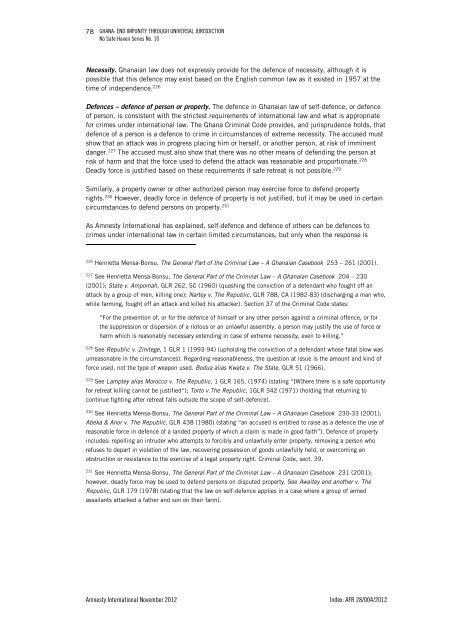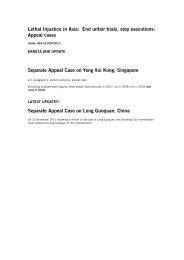Ghana - Amnesty International
Ghana - Amnesty International
Ghana - Amnesty International
Create successful ePaper yourself
Turn your PDF publications into a flip-book with our unique Google optimized e-Paper software.
78GHANA: END IMPUNITY THROUGH UNIVERSAL JURISDICTIONNo Safe Haven Series No. 10Necessity. <strong>Ghana</strong>ian law does not expressly provide for the defence of necessity, although it ispossible that this defence may exist based on the English common law as it existed in 1957 at thetime of independence. 226Defences – defence of person or property. The defence in <strong>Ghana</strong>ian law of self-defence, or defenceof person, is consistent with the strictest requirements of international law and what is appropriatefor crimes under international law. The <strong>Ghana</strong> Criminal Code provides, and jurisprudence holds, thatdefence of a person is a defence to crime in circumstances of extreme necessity. The accused mustshow that an attack was in progress placing him or herself, or another person, at risk of imminentdanger. 227 The accused must also show that there was no other means of defending the person atrisk of harm and that the force used to defend the attack was reasonable and proportionate. 228Deadly force is justified based on these requirements if safe retreat is not possible. 229Similarly, a property owner or other authorized person may exercise force to defend propertyrights. 230 However, deadly force in defence of property is not justified, but it may be used in certaincircumstances to defend persons on property. 231As <strong>Amnesty</strong> <strong>International</strong> has explained, self-defence and defence of others can be defences tocrimes under international law in certain limited circumstances, but only when the response is226Henrietta Mensa-Bonsu, The General Part of the Criminal Law – A <strong>Ghana</strong>ian Casebook 253 – 261 (2001).227See Henrietta Mensa-Bonsu, The General Part of the Criminal Law – A <strong>Ghana</strong>ian Casebook 204 – 230(2001); State v. Ampomah, GLR 262, SC (1960) (quashing the conviction of a defendant who fought off anattack by a group of men, killing one); Nartey v. The Republic, GLR 788, CA (1982-83) (discharging a man who,while farming, fought off an attack and killed his attacker). Section 37 of the Criminal Code states:“For the prevention of, or for the defence of himself or any other person against a criminal offence, or forthe suppression or dispersion of a riotous or an unlawful assembly, a person may justify the use of force orharm which is reasonably necessary extending in case of extreme necessity, even to killing.”228See Republic v. Zinitege, 1 GLR 1 (1993-94) (upholding the conviction of a defendant whose fatal blow wasunreasonable in the circumstances). Regarding reasonableness, the question at issue is the amount and kind offorce used, not the type of weapon used. Bodua alias Kwata v. The State, GLR 51 (1966).229See Lamptey alias Morocco v. The Republic, 1 GLR 165, (1974) (stating “[W]here there is a safe opportunityfor retreat killing cannot be justified“); Torto v.The Republic, 1GLR 342 (1971) (holding that returning tocontinue fighting after retreat falls outside the scope of self-defence).230See Henrietta Mensa-Bonsu, The General Part of the Criminal Law – A <strong>Ghana</strong>ian Casebook 230-33 (2001);Abeka & Anor v. The Republic, GLR 438 (1980) (stating “an accused is entitled to raise as a defence the use ofreasonable force in defence of a landed property of which a claim is made in good faith”). Defence of propertyincludes: repelling an intruder who attempts to forcibly and unlawfully enter property, removing a person whorefuses to depart in violation of the law, recovering possession of goods unlawfully held, or overcoming anobstruction or resistance to the exercise of a legal property right. Criminal Code, sect. 39.231See Henrietta Mensa-Bonsu, The General Part of the Criminal Law – A <strong>Ghana</strong>ian Casebook 231 (2001);however, deadly force may be used to defend persons on disputed property. See Awaitey and another v. TheRepublic, GLR 179 (1978) (stating that the law on self-defence applies in a case where a group of armedassailants attacked a father and son on their farm).<strong>Amnesty</strong> <strong>International</strong> November 2012 Index: AFR 28/004/2012
















